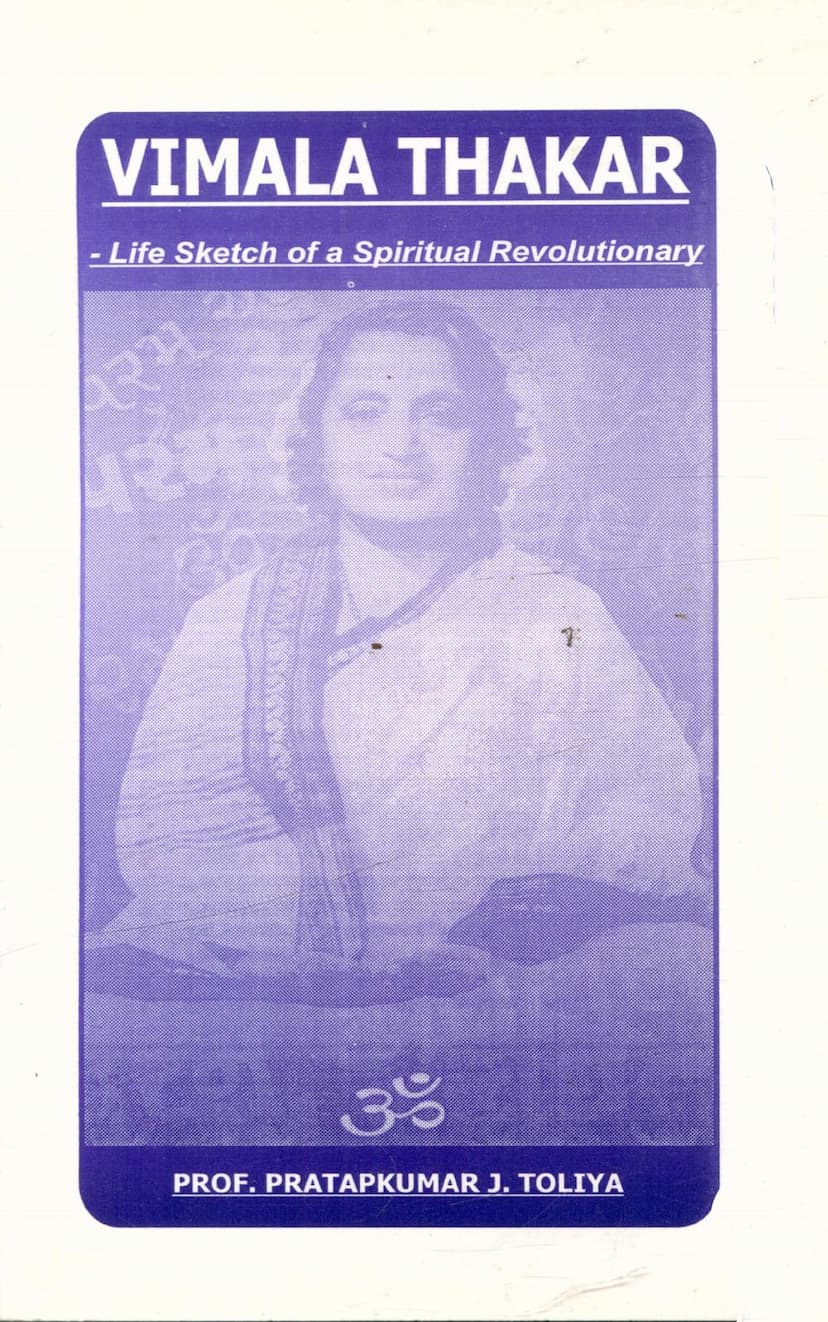Vimala Thakar Life Sketch
Added to library: September 2, 2025

Summary
Here's a comprehensive summary of the provided Jain text, "Vimala Thakar: Life Sketch of a Spiritual Revolutionary," by Prof. Pratapkumar J. Toliya:
This book is a biographical sketch of Vimala Thakar, portrayed as a "Spiritual Revolutionary" and a "Vibrant Woman Power," a role model for young girls. The author, Prof. Pratap Kumar J. Toliya, positions Vimala Thakar as a key figure in the emerging "Synthetic Age of Spirituality and Science."
Key Themes and Aspects of Vimala Thakar's Life:
-
Significant Birth: Vimala Thakar was born on April 15, 1921, which was Ramanavami, the auspicious birthday of Lord Rama. The author highlights the significance of this birth, connecting Vimala Thakar to Rama's ideal of righteousness and duty within a householder's life. Her birth also coincided with her maternal grandfather's birthday and death anniversary, adding a layer of symbolic significance.
-
Spiritual Synthesis: Vimala Thakar is presented as a practitioner of the unification of Spirituality and Science. She is seen as a forerunner in an age where these two domains are increasingly integrated.
-
Influence of Family and Ancestry:
- Maternal Grandfather (Nanaji): Sri Yadavrayji Bhagdikar, a wealthy Jagirdar and lawyer, significantly influenced Vimala Thakar from her childhood. He was a devout follower of "Rama Nama" chanting, lived an ascetic life within a householder's framework, and his home was a hub for saints and scholars, including Swami Vivekananda.
- Father: Shree Bagaram Chimanjee Thakar, known as 'Bapu Saheb', was a scholarly advocate, a rationalist, and a freedom fighter. He was also deeply interested in music and instilled Vimala Thakar with a revolutionary spirit and love for learning.
- Mother: Chandrikaji, affectionately called 'Akka', though less formally educated, possessed immense practical wisdom, generosity, and hospitality. She too participated in the Satyagraha movement and underwent imprisonment.
-
Education - Unique and Self-Acquired: Vimala Thakar showed an early disinterest in traditional academic pursuits, driven by a deep quest for spiritual knowledge from the age of five. She viewed herself as an ascetic even in childhood. Her formal education was challenging and self-driven, involving self-earned funds to attend college. She excelled in various extracurricular activities like oratory, music, horse riding, swimming, and even military training, demonstrating her multifaceted capabilities. A particularly striking aspect of her education was her solitary stay in Swami Ramateerth's cave in the Himalayas during her college years, showcasing her immense willpower and courage.
-
Bhoodan Movement: After her education, Vimala Thakar dedicated ten years of her life to the Bhoodan Movement, initiated by Acharya Vinoba Bhave. She traveled extensively across India, often under difficult conditions, embodying the movement's spirit of peaceful land reform and "Jai Jagat" (Victory to the World). During this period, she experienced a severe accident and subsequent health challenges, from which she recovered with the help of individuals like Pandit Omkarnath Thakur (music) and J. Krishnamurti (healing).
-
Mount Abu (Arbudachala): Vimala Thakar established a long residence at "Shivkuti" in Mount Abu, a place that became a sanctuary for seekers. Here, she delved deeply into the study of Srimad Rajchandraji's works, producing influential books. This period (1963-2009) was marked by intense study, exploration of spirituality and science, and the gradual organization of retreats and study camps.
-
Foreign Tours: From 1953 to 1991, Vimala Thakar undertook extensive foreign tours, visiting numerous countries. These tours were characterized by informal gatherings, financial management focused on travel expenses, and sharing her integrated understanding of spirituality and science with people worldwide. The "Friends of Vimala" network emerged during this phase.
-
Last Phase and Ultimate Voyage: In her later years, Vimala Thakar continued to reside at Shivkuti, maintaining an active life focused on spiritual exploration and synthesis. She gradually reduced her diet and stopped taking medicines. Before her passing, she expressed a desire for a simple departure, eschewing elaborate rituals and condolence meetings. Her final days were marked by a deep immersion in divine existence, consuming only Ganges water and observing silence, reminiscent of Jain Samlekhana or Santhara. She passed away peacefully on March 11, 2009, on the anniversary of Chaitanya Mahaprabhu, demonstrating the "Art of Dying" with grace and equanimity. She was honored with a Guard of Honour by the Government of India.
-
Unique Synthesizing Significance: The book emphasizes the profound connection between Vimala Thakar's inner silence and her spoken words. Her vast body of work, including books and audio-visual recordings, reflects her deep, integrated experience of spirituality and science. Her speech is described as natural, simple, balanced, and emanating from a place of profound inner awareness.
-
Moulders and Makers (But No Gurus): The book lists numerous influential figures who shaped Vimala Thakar's life, including saints, philosophers, and leaders, but explicitly states that none were her "GURU." This highlights her independent spiritual journey and her ability to draw wisdom from various sources without being bound by any single authority.
Overall Message:
The "Life Sketch of a Spiritual Revolutionary" portrays Vimala Thakar as an extraordinary individual who transcended conventional boundaries. She embodied a harmonious integration of spirituality and science, a spirit of revolution and self-reliance, and a profound commitment to serving humanity and spreading universal values. Her life is presented as a testament to the power of inner exploration, dedication, and a synthesized approach to living. The book also introduces the work of the publisher, Jina Bharati and Vardhaman Bharati International Foundation, in spreading Jainology and promoting spiritual and cultural values through music and knowledge.